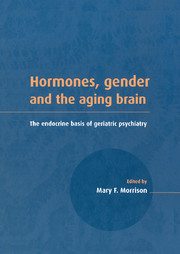Book contents
- Frontmatter
- Contents
- List of contributors
- Preface
- Acknowledgments
- Part I Overview
- Part II Hormones and mental health in the elderly
- 3 The hypothalamic–pituitary–adrenal axis in aging: preclinical and clinical studies
- 4 The hypothalamic–pituitary–thyroid axis
- 5 Estrogen and depression in aging women
- 6 The role of testosterone in male depression
- 7 Dehydroepiandrosterone in aging and mental health
- 8 Sex hormones, cognition, and dementia in the elderly
- 9 Effects of estrogen on basal forebrain cholinergic neurons and cognition: implications for brain aging and dementia in women
- 10 Gender and schizophrenia
- 11 Sex steroids and anxiety disorders
- 12 Gender and hormonal factors in pain and pain inhibition
- Part III Effects of hormones and behavior on immune function
- Part IV Hormones and gender differences in psychotropic drug metabolism
- Index
9 - Effects of estrogen on basal forebrain cholinergic neurons and cognition: implications for brain aging and dementia in women
from Part II - Hormones and mental health in the elderly
Published online by Cambridge University Press: 18 September 2009
- Frontmatter
- Contents
- List of contributors
- Preface
- Acknowledgments
- Part I Overview
- Part II Hormones and mental health in the elderly
- 3 The hypothalamic–pituitary–adrenal axis in aging: preclinical and clinical studies
- 4 The hypothalamic–pituitary–thyroid axis
- 5 Estrogen and depression in aging women
- 6 The role of testosterone in male depression
- 7 Dehydroepiandrosterone in aging and mental health
- 8 Sex hormones, cognition, and dementia in the elderly
- 9 Effects of estrogen on basal forebrain cholinergic neurons and cognition: implications for brain aging and dementia in women
- 10 Gender and schizophrenia
- 11 Sex steroids and anxiety disorders
- 12 Gender and hormonal factors in pain and pain inhibition
- Part III Effects of hormones and behavior on immune function
- Part IV Hormones and gender differences in psychotropic drug metabolism
- Index
Summary
Introduction
Research over the past 30 years has demonstrated that the brain is an important target organ for estrogen effects. Studies using sensitive autoradiographic and immunohistochemical techniques have documented the presence of estrogen receptors throughout the brain (Brown et al., 1995; Österlund et al., 1998; Pfaff, 1968; Rainbow et al., 1982). The highest levels of receptors are often detected in brain areas involved in gonadal regulation, physiologic homeostasis, and reproductive behavior. Receptors have also been detected throughout the neocortex, hippocampus, and amygdala – regions of the brain long known to be associated with higher cognitive functions such as learning, memory, and attention. Some of the effects of estrogen recently described include changes in neurotransmitter production and release, changes in the number and frequency of synaptic contacts, and changes in the expression and regulation of second messengers and transcription factors, as well as effects on cell survival and growth.
Given the variety of estrogen effects throughout the brain, it is not surprising that estrogen should affect cognitive processes or that the loss of estrogen would play a role in the biology of brain aging in women. Consider that women in the United States reach menopause at approximately 51 years of age, and that the average lifespan for women in the United States is 79 years. This means that approximately 28 years of a woman's life are postmenopausal and reflect a hypoestrogenic state.
- Type
- Chapter
- Information
- Hormones, Gender and the Aging BrainThe Endocrine Basis of Geriatric Psychiatry, pp. 183 - 222Publisher: Cambridge University PressPrint publication year: 2000
- 3
- Cited by



